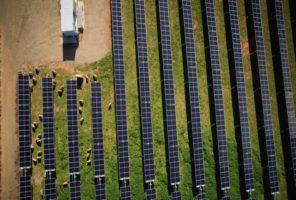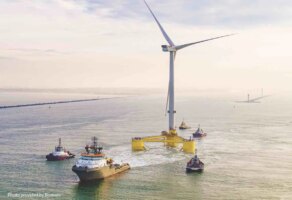Power companies in China, the United States, and India, are increasing their share of local solar capacity, while European multinationals are building a global portfolio of solar, according to recent figures released by Wiki-Solar.
Wiki-Solar – which bills itself as “the world leader in information about the deployment of solar photovoltaic power stations of 4 MW and above”, but which only tracks around 150GW of the world’s capacity of utility-scale solar (both operating and under development), or around 30% of projects – published its list of the world’s top solar power plant owners on Tuesday, revealing that some of the world’s leading energy utilities are beginning to build significant solar portfolios.
Specifically, Chinese, US, and Indian power companies are growing their solar capacity by buying at home and now make up the lion’s share of utility-scale solar capacity owners – whereas only five years ago only six utilities were found in the top 30 solar owners.
 “Leading Chinese and US utilities like SPIC and NextEra have been prominent for some years while dynamic growth in India has brought utilities like Adani and NTPC into the list,” said Wiki-Solar founder Philip Wolfe. “The top European utilities have held position by investing overseas; notably for ENEL in South and Central America, and for EDF in Asia and America.”
“Leading Chinese and US utilities like SPIC and NextEra have been prominent for some years while dynamic growth in India has brought utilities like Adani and NTPC into the list,” said Wiki-Solar founder Philip Wolfe. “The top European utilities have held position by investing overseas; notably for ENEL in South and Central America, and for EDF in Asia and America.”
According to Wiki-Solar’s database, independent power producers (IPPs) now hold a relatively lower share than they once did, now that global energy utilities are becoming more active, but IPPs are still steadily building significant portfolios. Infrastructure funds like Global Infrastructure Partners and Berkshire Hathaway in the US are particularly prominent with 2.06 GW and 833 MW respectively.
Many of the top owners develop their own solar projects, but a number also buy projects from specialist solar project developers. The top solar project developers not also listed as major plant owners are as follows:
 As mentioned earlier, Wiki-Solar’s figures need to be taken gently, and they point out that contributions from some participants, both on and off these lists, may be understated, as Wiki-Solar’s database only holds full participant data for around 30% of projects.
As mentioned earlier, Wiki-Solar’s figures need to be taken gently, and they point out that contributions from some participants, both on and off these lists, may be understated, as Wiki-Solar’s database only holds full participant data for around 30% of projects.
“Several leading players keep us informed about their contributions, but the involvement of others may be substantially understated,” explained Wiki-Solar’s Philip Wolfe.










